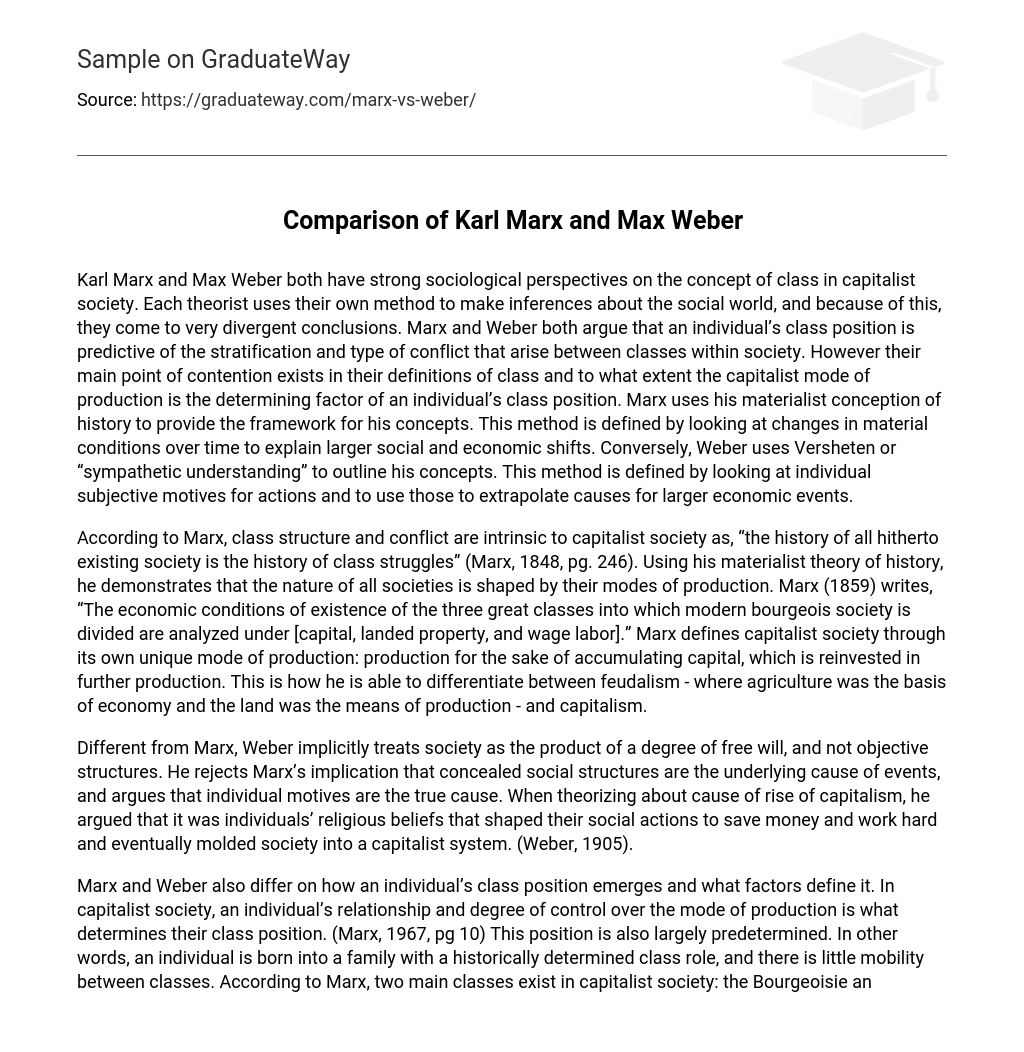Despite their different conclusions, Karl Marx and Max Weber have distinct methods for analyzing class in capitalist society. Both theorists agree that an individual’s class position can predict societal stratification and conflicts between classes. However, they disagree on the definitions of class and the extent to which one’s class position is determined by the capitalist mode of production. Marx uses a materialist conception of history, studying changes in material conditions over time to explain broader social and economic transformations. On the other hand, Weber employs Versheten or “sympathetic understanding” to define his concepts, examining individual subjective motives for actions and using them to understand the causes of larger economic events.
According to Marx (1848, pg. 246), class structure and conflict are inherent to capitalist society as “the history of all hitherto existing society is the history of class struggles.” Applying his materialist theory of history, Marx (1859) investigates how societies are shaped by their modes of production. He explores the economic conditions of existence for the three major classes in modern bourgeois society: capital, landed property, and wage labor. Marx defines capitalist society by its unique mode of production, which involves producing for the purpose of accumulating capital that is reinvested for further production. In this way, he distinguishes capitalism from feudalism, where agriculture and land were the foundation of the economy.
In contrast to Marx, Weber views society as being influenced by individual free will rather than objective structures. He disagrees with Marx’s belief that hidden social structures are the root cause of events and instead argues that it is individual motives that truly drive these events. In his analysis of the rise of capitalism, Weber suggests that it was people’s religious beliefs that influenced their actions to save money and work hard, ultimately leading to the formation of a capitalist society. (Weber, 1905).
Marx and Weber have different perspectives regarding how an individual’s class position is formed and influenced. According to Marx, in a capitalist society, one’s class position is determined by their relationship to and control over the mode of production. This is mostly predetermined as individuals are born into families with historically defined class roles, and social mobility between classes is limited. Marx identifies two primary classes in capitalist society: the Bourgeoisie who own the means of production and employ wage laborers, and the Proletariat who are wage laborers without their own means of production. Conversely, Weber disagrees with Marx’s viewpoint. He argues that it is not the mode of production but rather the mode of distribution that determines opportunities for profitable transactions for those who possess goods but may not necessarily need to exchange them. Weber distinguishes between those who have property and those who do not, using these categories as fundamental for all class situations.
According to Marx (1848, pg. 255), class conflict in a capitalist society is inevitable as it has been historically rooted in the struggle between oppressor and oppressed classes. The relationship between the Proletariat and Bourgeoisie is mutually dependent – each class relies on the other for survival. The Proletariat depends on capital for employment without which they would perish; while capital relies on labor-power to exploit, which it must purchase (Marx, 1847, pg. 15). However, in a profit-driven capitalist society, the Bourgeoisie shamelessly exploits the Proletariat (Marx, 1848, pg.248). This exploitation occurs because the Proletariat lacks ownership of means of production and is compelled to work under conditions dictated by the Bourgeoisie to sustain themselves. Taking advantage of this situation, the bourgeoisie extracts extra labor from workers with an aim to maximize their profits.
Marx posits that capitalism generates a conflict between classes, with one class benefiting from the weakness of the other. Each class possesses its own interests based on its position in the productive system. The Bourgeoisie seeks to maximize profits and exploit workers, while the Proletariat desires higher wages and the overthrow of class hierarchy. Consequently, these two classes constantly oppose each other and engage in struggle. Marx contends that their divergent interests result in one being oppressor and the other oppressed.
In contrast, Weber defines class according to access to goods and argues that individuals within the same class may have to compete for those goods. He rejects Marx’s concept of shared interests among classes as he believes that class unity is often unrecognized, only becoming apparent when compared with others. Weber suggests that social stratification is not solely determined by economic class but also influenced by a combination of economic factors, social factors (referred to as “style of life”), and political influence. Like Marx, Weber acknowledges the oppressive nature of stratification but views it as both a cause and an outcome of class conflict.
Conflict occurs when groups compete for higher economic, social and political wealth, and it is during that struggle when positions in the hierarchy emerge, based on who gains control of the state. This is why Weber focuses more on conflicts between groups of individuals, instead of structured oppositions. Marx defines class by an individual’s relationship to the modes of production in capitalist society. The exploitative nature of the dynamic between the Bourgeoisie and Proletariat and the differences in their interests leads to stratification and class conflict. He comes to these conclusions using his materialist conception of history. Weber defines class by an individual’s relationship to the modes of distribution in society, or their ability to acquire the things that they want. For Weber, class conflict arises between the haves and have-nots in society, and inherent competition exists between individuals for wealth, status and political prestige. He comes to his concludes using his Versheten.





